#EMR Software Development
Explore tagged Tumblr posts
Text
EHR and EMR Software Development Company | Bitcot Looking for expert emr software development services? Bitcot offers customized, scalable EMR solutions designed for hospitals, clinics, and healthcare startups. Their services include cloud-based EMR platforms, mobile EMR app development, and custom dashboards that enhance workflow efficiency and patient care. With a strong focus on HIPAA compliance, data security, and seamless integration with labs, pharmacies, and billing systems, Bitcot delivers smart, reliable healthcare technology.
#emr software development#emr software solutions#ehr software development#ehr software development company#emr software development company#custom ehr software development
0 notes
Text
Healthcare industry is continually booming the world with the latest tech innovations. EMR Naming Electronic Medical Records helps to streamline the process of patients' health and care. EMR centralizes the patient information. Meaning that it allows to record, store and manage the patients data. There are some renowned EMR software development companies who provide the best solution to transform the healthcare industry. Companies like eSparkBiz, Ballast Lane Applications, Brights.io, Devtorium.. Etc are some of them. You can pick any of the above listed companies for the complete EMR software development solution.
If you want to know about the EMR systems and EMR development companies, read this blog for details.
#EMR Software development companies in 2025#EMR Software development companies#EMR Software development#EMR Development
0 notes
Text
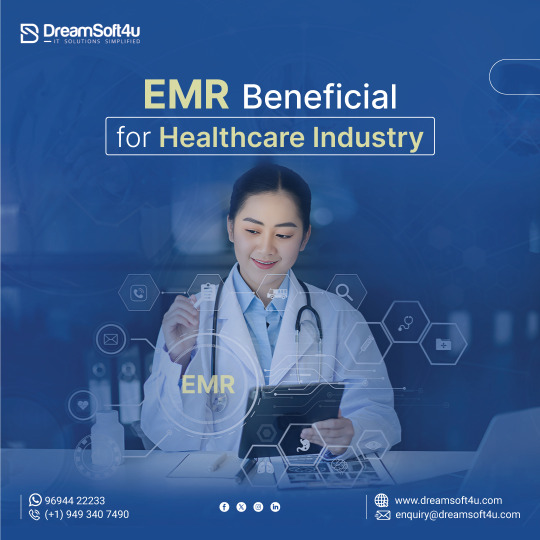
Electronic Medical Record Systems will first incorporate big data and analytics and use artificial intelligence. These tools will enable doctors to find patterns and conclusions with health sector data. For instance, they can perhaps forecast future health problems that may be fatal once they have developed, but with early diagnosis, they can be treated depending on overall health requirements.
0 notes
Link
0 notes
Text
Revolutionizing Patient Care: On-Demand Healthcare Mobile App Development Company for 2025

Introduction: Healthcare at Your Fingertips.
In today's fast-paced digital world, healthcare must keep up with the growing demand for real-time services and patient-centric experiences. On-demand healthcare mobile apps are now playing a pivotal role in modernizing the healthcare industry by allowing patients to schedule appointments, consult physicians remotely, and track their wellness anytime, anywhere. At CQLsys Technologies, we are at the forefront of this digital health transformation. As a trusted Healthcare App Development Company, we offer a wide range of custom healthcare mobile app solutions tailored to hospitals, clinics, wellness brands, and startups.
Whether you're planning to develop a medical appointment app, a telemedicine platform, or a personalized health tracking tool, our comprehensive Healthcare App Development Services are designed to deliver secure, scalable, and intuitive user experiences.
Why On-Demand Healthcare Apps Are Transforming the Industry
On-demand healthcare apps are rapidly reshaping patient-provider interactions. By reducing wait times, improving remote access to healthcare professionals, and enabling real-time health tracking, these apps empower patients while streamlining provider workflows. With features like digital prescriptions, chat-based support, and secure EHR integrations, on-demand healthcare solutions are becoming indispensable.
Healthcare institutions now rely on HIPAA-compliant healthcare App Development to protect sensitive patient data and maintain regulatory standards. Whether it's Health Monitoring App Development, EHR/EMR App Development, or launching a virtual clinic, mobile technology ensures better health outcomes and faster innovation cycles.
Tailored Healthcare App Development for All Stakeholders

Generic solutions don’t address the complexity of healthcare workflows. That’s why Custom Healthcare App Development is essential. CQLsys Technologies builds smart, custom-fit mobile solutions that align perfectly with your operational goals and compliance requirements.
Whether you're a hospital seeking centralized patient data access, a clinic looking to digitize appointments, or a startup building the next big Telemedicine App Development product, we offer modular, scalable, and secure healthcare app solutions.
Our apps integrate seamlessly with third-party platforms, wearable devices, and legacy systems, ensuring they evolve with your business. From Mobile Health App Development to fitness and wellness tracking, we craft experiences that are functional, flexible, and future-ready.
Key On-Demand Healthcare App Solutions We Offer

1. Medical Appointment App Development: Patients no longer need to wait on hold or stand in queues. Our appointment apps let users book, reschedule, or cancel visits effortlessly. Real-time calendar sync, doctor profiles, and reminders ensure a seamless experience.
2. Telemedicine App Development:t Virtual healthcare is no longer optional. Our telemedicine apps support secure video consultations, AI-based triaging, prescription sharing, and chat functionality, bringing doctors and patients closer than ever.
3. Health Tracking App Development Empower users to monitor vital health stats—like glucose levels, heart rate, and sleep patterns—through feature-rich mobile apps integrated with wearable devices and health sensors.
4. Patient Care App Development Support continuous care through personalized reminders, post-surgery follow-ups, and symptom checkers. These apps improve patient engagement and enhance recovery outcomes.
5. Fitness and Wellness App Development. From diet plans to exercise tracking, our wellness apps are designed to help users meet lifestyle goals. Custom-built for wellness brands, gyms, and health coaches.
Built-In HIPAA Compliance for Security and Trust.
We know that trust is the backbone of any healthcare service. At CQLsys, all our mobile health applications are developed to meet HIPAA compliance standards. This means strong data encryption, secure cloud infrastructure, and strict access control.
Our team implements features such as two-factor authentication, audit trails, and role-based access, ensuring maximum security for patient records. If you're looking for HIPAA-compliant healthcare App Development, we are your go-to partner.
Complete Suite of Healthcare App Development Services.

As a full-cycle Healthcare Software Development company, we offer:
Healthcare App Development for Startups – Rapid prototyping, MVP development, and scalable builds for startup healthcare ventures.
Mobile Health App Development – User-friendly apps focused on tracking wellness, fitness, and medical history for proactive care.
EHR/EMR App Development – Integrated apps that sync with existing hospital records and ensure data continuity.
Healthcare App for Hospitals – Unified platforms for managing hospital operations, patient workflows, and remote consultations.
Health Monitoring App Development – Real-time monitoring with wearable integration for chronic care and elderly support.
Why Choose CQLsys Technologies for Healthcare App Development
Healthcare Domain Expertise We understand healthcare—inside and out. Our developers, designers, and analysts have years of experience building compliant, reliable, and scalable Health Tech App Development solutions.
Customized Development. Every healthcare organization is different. We provide Custom Healthcare App Development based on individual workflows, compliance needs, and growth targets.
360° Development Approach From planning and wireframing to coding, testing, and post-deployment support, we deliver end-to-end mobile healthcare solutions.
Future-Ready Architecture Our scalable architecture ensures your app grows with your business and can be adapted to include emerging technologies like AI and IoT.
Cross-Platform Functionality Using Flutter, React Native, and native stacks, we deliver apps that perform optimally across Android, iOS, and web environments.
Emerging Trends in Healthcare App Development
The next frontier in healthcare app development is driven by innovation:
AI-Based Diagnostics: Predictive healthcare using machine learning.
IoT Integration: Wearable-based real-time vitals tracking.
Blockchain: Tamper-proof patient record storage and sharing.
Voice Assistants: Voice-activated health apps for elderly or differently-abled users.
At CQLsys, we actively incorporate these trends into our development strategy, making us a top choice for Healthcare App Development for Startups and established enterprises alike.
Conclusion: Redefine Healthcare with CQLsys.
In a healthcare world moving toward digital-first solutions, your mobile app can be the game-changer that improves care outcomes, increases access, and enhances operational efficiency.
CQLsys Technologies stands out as a top Healthcare App Development Company dedicated to delivering innovative, HIPAA-compliant, and user-focused healthcare mobile solutions. Whether it's a telemedicine app, a Patient Care App Development project, or a full-fledged Healthcare App for Hospitals, we help you build for impact.
Take the first step toward smarter healthcare. Get in touch with us today to build a secure, scalable, and successful healthcare mobile app.
#On‑Demand Healthcare Mobile App Development Company#Healthcare App Development Company#Healthcare App Solutions#Medical App Development Services#Medical Appointment App Development#Custom Healthcare App Development#Telemedicine App Development#Patient Care App Development#Health Tracking App Development#Healthcare Mobile App Solutions#Health Monitoring App Development#Health Tech App Development#Healthcare Software Development#Healthcare App Development Services#Fitness and Wellness App Development#Healthcare App for Hospitals#HIPAA Compliant Healthcare App Development#Mobile App Development for Healthcare#Healthcare App Development for Startups#Mobile Health App Development#EHR/EMR App Development#Healthcare App Developers
0 notes
Text
#emr software#emr portal#technology#software development#custome software developments#software engineering
0 notes
Text
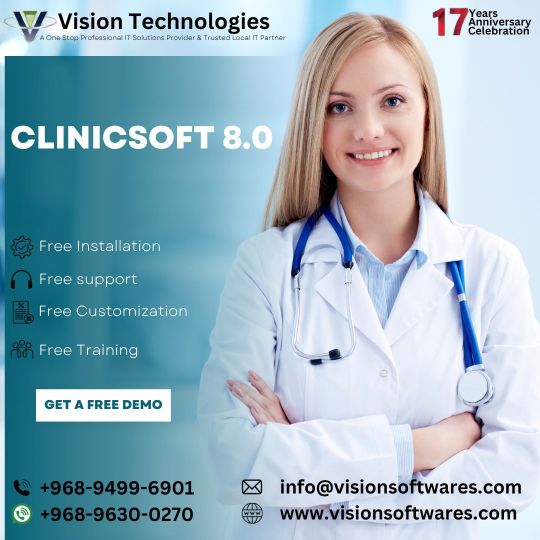
The best medical clinic software, approved by ministry of health, Department of health and DHA, connected to Malaffi, Riayati and Nabidh EMR, lets take a tour. Streamline your medical clinic operations with our cutting-edge clinic software. Enhance patient care, optimize scheduling, and simplify billing with our intuitive and efficient medical management solution. Explore how our software can transform your clinic's efficiency today
#Clinicsoft#Clinic software#Medical Software#medical clinic software#EMR#dubai#sharjah#abu dhabi#Dubai health Autority#Ministry of health#Department of health#DHA#MOH#DOH#Mallafi#Riayati#uae#Nabidh#medical software development#best medical software
0 notes
Text
Understanding the Difference between Custom EHR and EMR Software Solutions
In the ever-evolving healthcare landscape, electronic health records (EHR) and electronic medical records (EMR) have revolutionized the way medical data is collected, stored, and managed. While both EHR and EMR systems share the common goal of digitizing patient information, there are distinct differences between them, particularly when it comes to customization options. In this blog post, we will explore the dissimilarities between custom EHR and EMR software solutions, highlighting their unique features, benefits, and considerations.
I. Electronic Health Records (EHR): EHR software is a comprehensive electronic system designed to collect, store, and exchange patient health information across various healthcare providers and settings. Here are the key aspects of custom EHR solutions:
Interoperability: EHRs are built to enable seamless data sharing between different healthcare entities, including hospitals, clinics, pharmacies, and laboratories. They prioritize interoperability standards to ensure data continuity and collaboration.
Comprehensive Patient Data: EHRs provide a holistic view of a patient's medical history, including diagnoses, medications, allergies, lab results, immunization records, and more. This integrated approach allows healthcare professionals to access and analyze a patient's complete health record.
Customizability: Custom EHR solutions offer flexibility and tailoring options to match the specific needs of healthcare organizations. They can be adapted to suit various specialties, workflows, and regulatory requirements, ensuring optimal usability and efficiency.
Care Coordination: EHRs facilitate coordinated care by enabling healthcare providers to access and update patient records in real-time. This enhances communication and collaboration among different healthcare teams involved in a patient's care journey.
II. Electronic Medical Records (EMR): EMR software focuses primarily on individual patient records within a single healthcare organization. While EMR systems share some similarities with EHRs, they differ in their scope and customization capabilities:
Internal Record Keeping: EMR solutions are designed to digitize and streamline the internal processes of a specific healthcare facility. They provide tools for capturing patient information, medical history, diagnoses, prescriptions, and treatment plans within the confines of that organization.
Limited Data Sharing: Unlike EHRs, EMR systems typically lack robust interoperability features. They are primarily optimized for use within a single healthcare provider and may not facilitate easy data exchange with external entities.
Workflow Optimization: Custom EMR software focuses on improving the efficiency and accuracy of internal workflows. It allows healthcare professionals to automate routine tasks, generate reports, schedule appointments, and manage billing processes, thus enhancing overall operational efficiency.
Specialty-Specific Solutions: EMR software can be tailored to meet the specific requirements of different medical specialties. For example, EMR systems for cardiology, paediatrics, or oncology may include specialized templates and features to support those areas.
While both EHR and EMR systems have their distinct advantages, understanding their differences is crucial when considering software solutions for healthcare organizations. Custom EHR solutions excel in interconnectivity, comprehensive patient information, and adaptability to diverse workflows. On the other hand, custom EMR software offers focused internal record management, workflow optimization, and specialty-specific customization. By evaluating the unique needs and goals of your healthcare facility, you can choose the right solution that best aligns with your requirements and delivers enhanced patient care and operational efficiency.
Seeking a reliable and experienced software development company specializing in custom Electronic Health Record (EHR) and Electronic Medical Record (EMR) software solutions? Look no further! Knovator offers tailored EHR and EMR software solutions that cater to the unique needs of your healthcare organization.
Contact us today to discuss your EHR/EMR software requirements and schedule a consultation. We are EHR and EMR software development company, committed to delivering a tailor-made solution that empowers your healthcare organization, streamlines workflows, and improves patient outcomes.
Contact Information:
Contact: +91 9499501397
Email: [email protected]
Website: https://knovator.com/emr-ehr-software-development/
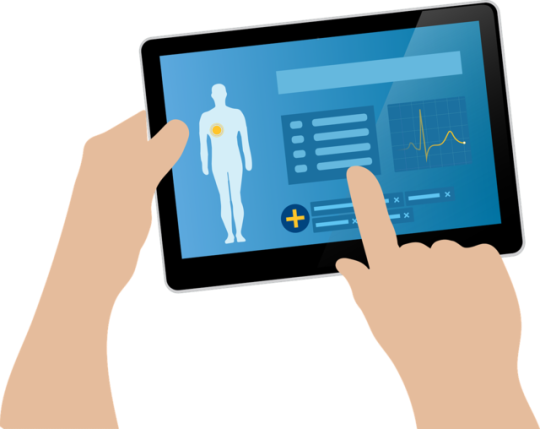
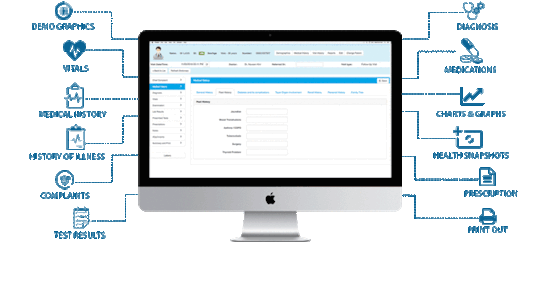
1 note
·
View note
Text
Your Journey Through the AWS Universe: From Amateur to Expert
In the ever-evolving digital landscape, cloud computing has emerged as a transformative force, reshaping the way businesses and individuals harness technology. At the forefront of this revolution stands Amazon Web Services (AWS), a comprehensive cloud platform offered by Amazon. AWS is a dynamic ecosystem that provides an extensive range of services, designed to meet the diverse needs of today's fast-paced world.

This guide is your key to unlocking the boundless potential of AWS. We'll embark on a journey through the AWS universe, exploring its multifaceted applications and gaining insights into why it has become an indispensable tool for organizations worldwide. Whether you're a seasoned IT professional or a newcomer to cloud computing, this comprehensive resource will illuminate the path to mastering AWS and leveraging its capabilities for innovation and growth. Join us as we clarify AWS and discover how it is reshaping the way we work, innovate, and succeed in the digital age.
Navigating the AWS Universe:
Hosting Websites and Web Applications: AWS provides a secure and scalable place for hosting websites and web applications. Services like Amazon EC2 and Amazon S3 empower businesses to deploy and manage their online presence with unwavering reliability and high performance.
Scalability: At the core of AWS lies its remarkable scalability. Organizations can seamlessly adjust their infrastructure according to the ebb and flow of workloads, ensuring optimal resource utilization in today's ever-changing business environment.
Data Storage and Backup: AWS offers a suite of robust data storage solutions, including the highly acclaimed Amazon S3 and Amazon EBS. These services cater to the diverse spectrum of data types, guaranteeing data security and perpetual availability.
Databases: AWS presents a panoply of database services such as Amazon RDS, DynamoDB, and Redshift, each tailored to meet specific data management requirements. Whether it's a relational database, a NoSQL database, or data warehousing, AWS offers a solution.
Content Delivery and CDN: Amazon CloudFront, AWS's content delivery network (CDN) service, ushers in global content distribution with minimal latency and blazing data transfer speeds. This ensures an impeccable user experience, irrespective of geographical location.
Machine Learning and AI: AWS boasts a rich repertoire of machine learning and AI services. Amazon SageMaker simplifies the development and deployment of machine learning models, while pre-built AI services cater to natural language processing, image analysis, and more.
Analytics: In the heart of AWS's offerings lies a robust analytics and business intelligence framework. Services like Amazon EMR enable the processing of vast datasets using popular frameworks like Hadoop and Spark, paving the way for data-driven decision-making.
IoT (Internet of Things): AWS IoT services provide the infrastructure for the seamless management and data processing of IoT devices, unlocking possibilities across industries.
Security and Identity: With an unwavering commitment to data security, AWS offers robust security features and identity management through AWS Identity and Access Management (IAM). Users wield precise control over access rights, ensuring data integrity.
DevOps and CI/CD: AWS simplifies DevOps practices with services like AWS CodePipeline and AWS CodeDeploy, automating software deployment pipelines and enhancing collaboration among development and operations teams.
Content Creation and Streaming: AWS Elemental Media Services facilitate the creation, packaging, and efficient global delivery of video content, empowering content creators to reach a global audience seamlessly.
Migration and Hybrid Cloud: For organizations seeking to migrate to the cloud or establish hybrid cloud environments, AWS provides a suite of tools and services to streamline the process, ensuring a smooth transition.
Cost Optimization: AWS's commitment to cost management and optimization is evident through tools like AWS Cost Explorer and AWS Trusted Advisor, which empower users to monitor and control their cloud spending effectively.
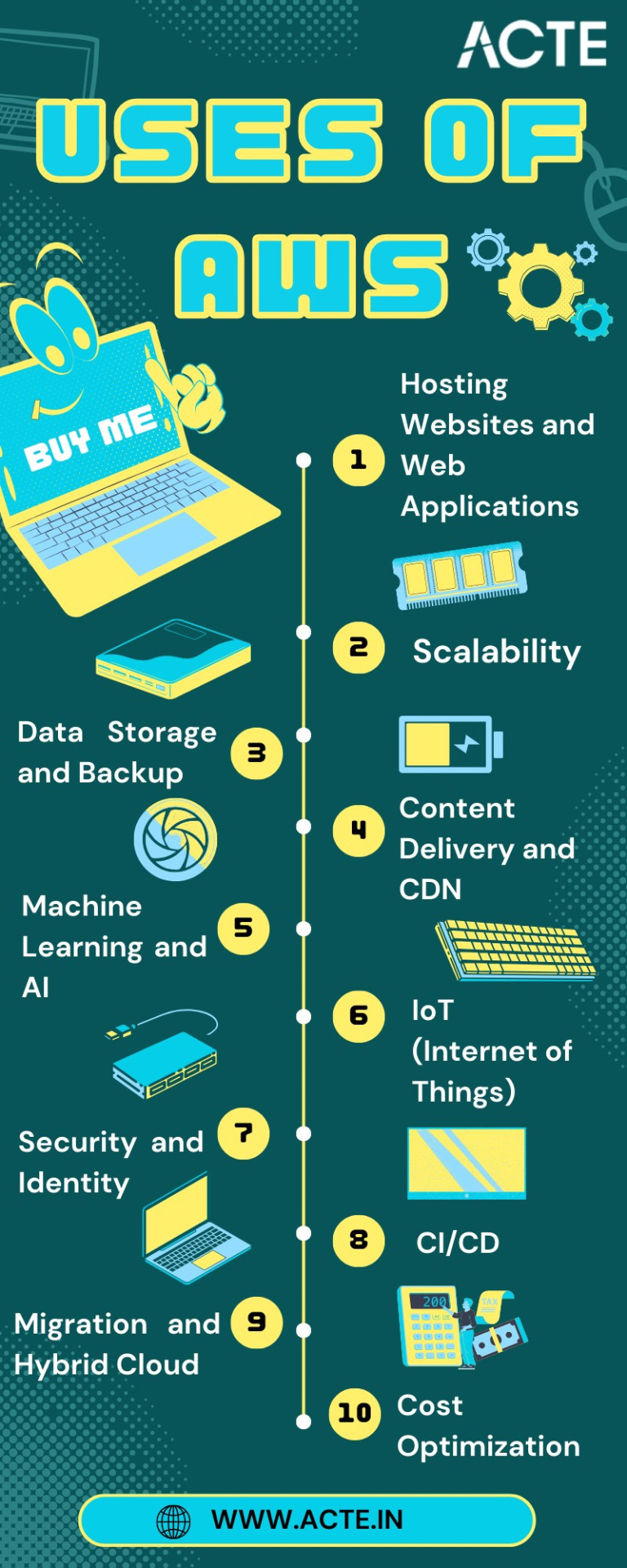
In this comprehensive journey through the expansive landscape of Amazon Web Services (AWS), we've embarked on a quest to unlock the power and potential of cloud computing. AWS, standing as a colossus in the realm of cloud platforms, has emerged as a transformative force that transcends traditional boundaries.
As we bring this odyssey to a close, one thing is abundantly clear: AWS is not merely a collection of services and technologies; it's a catalyst for innovation, a cornerstone of scalability, and a conduit for efficiency. It has revolutionized the way businesses operate, empowering them to scale dynamically, innovate relentlessly, and navigate the complexities of the digital era.
In a world where data reigns supreme and agility is a competitive advantage, AWS has become the bedrock upon which countless industries build their success stories. Its versatility, reliability, and ever-expanding suite of services continue to shape the future of technology and business.
Yet, AWS is not a solitary journey; it's a collaborative endeavor. Institutions like ACTE Technologies play an instrumental role in empowering individuals to master the AWS course. Through comprehensive training and education, learners are not merely equipped with knowledge; they are forged into skilled professionals ready to navigate the AWS universe with confidence.
As we contemplate the future, one thing is certain: AWS is not just a destination; it's an ongoing journey. It's a journey toward greater innovation, deeper insights, and boundless possibilities. AWS has not only transformed the way we work; it's redefining the very essence of what's possible in the digital age. So, whether you're a seasoned cloud expert or a newcomer to the cloud, remember that AWS is not just a tool; it's a gateway to a future where technology knows no bounds, and success knows no limits.
6 notes
·
View notes
Text

Epic is an electronic medical record system (EMR) and a world leader in providing hospitals with enterprise solutions for inpatient and ambulatory clinical, departmental, access, revenue cycle, and practice management functions. It offers the standard range of ‘core’ EHR features, and practices can add modules depending on specialty. Epic has a strong focus on patient engagement and facilitating remote care.
#Epic EMR System#EHR Integration#EMR Integration#EHR Challenges#EHR Software Systems#EMR Software Company#EHR Software Development#EMR Software Development
0 notes
Text
Hospital Commissioning Mistakes to Avoid – Lessons from SHPL Projects
Commissioning a hospital is one of the most critical phases in the lifecycle of a healthcare project. It’s the final step before a hospital opens its doors—but also the stage where many costly and avoidable mistakes are made. From untrained staff to missing licenses, a poorly executed commissioning can delay operations, damage reputation, and inflate costs.
SHPL Management Consultancy, with its deep experience in hospital planning and commissioning, has identified common pitfalls and developed a proven roadmap to help promoters launch smoothly and successfully.
What Is Hospital Commissioning?
Hospital commissioning involves:
Setting up equipment and infrastructure
Completing documentation and regulatory approvals
Recruiting and training staff
Conducting mock drills and testing systems
Ensuring readiness for clinical operations
It bridges the gap between project completion and patient care.
Common Commissioning Mistakes Hospitals Must Avoid
1. Incomplete Regulatory Compliance Mistake: Delayed license applications or missing documents during inspection. SHPL Solution: We prepare a checklist of all necessary approvals (fire, pollution, biomedical waste, PNDT, pharmacy, etc.) and manage timely application and follow-ups.
2. Untrained or Underprepared Staff Mistake: Staff hired at the last minute, with no induction or SOP training. SHPL Solution: We plan recruitment in advance, conduct induction training, and implement SOP-based operational drills before launch.
3. Equipment Not Calibrated or Commissioned Mistake: Critical machines installed but not tested, leading to operational delays. SHPL Solution: SHPL coordinates with vendors for proper installation, calibration, and documentation of all biomedical and diagnostic equipment.
4. Poorly Defined Workflows Mistake: Staff confusion on patient flow, responsibilities, or communication hierarchy. SHPL Solution: We develop clear SOPs, departmental flowcharts, and escalation protocols tailored to the hospital's structure.
5. IT and Digital Systems Not Ready Mistake: Hospital Management Software (HMS) installed late or not aligned with workflows. SHPL Solution: We finalize the software early, test modules in real-time, and train staff on billing, pharmacy, diagnostics, and EMR usage.
6. No Soft Launch or Mock Drills Mistake: Hospital opens without trial runs, leading to chaos on day one. SHPL Solution: We conduct full-scale dry runs, mock audits, and emergency simulations to test readiness and correct issues.
7. Ineffective Marketing and Outreach Before Launch Mistake: No awareness in the community, low footfall in initial weeks. SHPL Solution: SHPL prepares pre-launch branding and marketing plans targeting referral doctors, communities, and digital platforms.
SHPL’s End-to-End Commissioning Support Includes:
Licensing & regulatory guidance
Departmental readiness checklists
HR hiring, training & SOP implementation
Equipment coordination & installation
IT systems setup and trial runs
Launch planning, PR, and outreach support
Conclusion
Hospital commissioning is not just a technical handover—it’s a strategic milestone that defines how patients will perceive your hospital from day one. With SHPL Management Consultancy, hospital promoters avoid common mistakes, reduce delays, and enter the healthcare market with full operational readiness and confidence.
#HospitalCommissioning#SHPLManagementConsultancy#HospitalLaunchStrategy#HealthcareProjectConsulting#HospitalPlanning#MedicalFacilitySetup#HealthcareOperations#HospitalReadiness#HealthcareCompliance#HealthcareInfrastructure
0 notes
Text

Revolutionizing Healthcare: On-Demand Mobile App Development Company for 2025Connect with CQLsys Technologies to build secure, custom healthcare mobile apps that enhance patient outcomes and drive digital innovation.
#Healthcare App Development Company#Healthcare App Solutions#Medical App Development Services#Medical Appointment App Development#Custom Healthcare App Development#Telemedicine App Development#Patient Care App Development#Health Tracking App Development#Healthcare Mobile App Solutions#Health Monitoring App Development#Health Tech App Development#Healthcare Software Development#Healthcare App Development Services#Fitness and Wellness App Development#Healthcare App for Hospitals#HIPAA Compliant Healthcare App Development#Mobile App Development for Healthcare#Healthcare App Development for Startups#Mobile Health App Development#EHR/EMR App Development#Healthcare App Developers
0 notes
Text
0 notes
Text
Custom Telehealth Software Solutions: Empowering Personalized Virtual Care
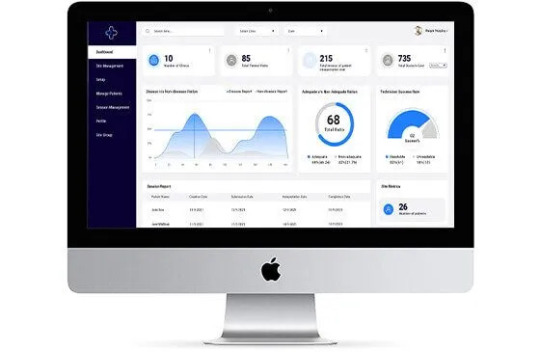
In the evolving landscape of modern healthcare, custom telehealth software solutions are revolutionizing the way care is delivered. No longer a novelty, telehealth has become a cornerstone of patient-provider interactions, enabling accessible, timely, and efficient care. While off-the-shelf telehealth platforms offer standard features, many healthcare providers are now turning to customized solutions to better meet their unique clinical workflows, compliance needs, and patient expectations.
What Are Custom Telehealth Software Solutions?
Custom telehealth software solutions are tailor-made digital platforms designed to support virtual healthcare delivery. Unlike generic platforms, these solutions are developed with specific functionality, branding, and user experience in mind. They can include video consultations, appointment scheduling, EHR integration, secure messaging, e-prescribing, and remote monitoring—engineered to fit a healthcare organization’s exact operational model.
Key Features of Custom Telehealth Solutions
Personalized User Interfaces User-friendly, intuitive interfaces can be designed for both patients and providers, ensuring easy access and interaction with telehealth services.
Seamless EHR/EMR Integration Custom solutions integrate smoothly with existing electronic health records, enabling real-time data access and documentation during virtual visits.
HIPAA-Compliant Security Built with end-to-end encryption, secure login protocols, and data protection features to meet strict privacy regulations like HIPAA or GDPR.
Multi-Specialty Support Platforms can be tailored to accommodate various specialties psychiatry, cardiology, etc.—with specialty-specific tools and workflows.
Remote Patient Monitoring (RPM) Custom modules can be added for tracking vitals and health data from wearables or home-based medical devices, facilitating chronic disease management.
Benefits of Custom Telehealth Software
Scalability: Built to grow with the organization, whether it's a small clinic or a multi-site hospital network.
Branding and Identity: Reflects the organization’s brand, offering a consistent look and feel across all patient touchpoints.
Improved Patient Experience: Custom workflows and communication tools enhance convenience and satisfaction.
Greater Provider Efficiency: Tailored tools streamline operations, reduce administrative burden, and improve clinical outcomes.
Future Outlook
The future of telehealth is hyper-personalized, AI-enhanced, and data-driven. Custom telehealth software is at the heart of this evolution, enabling providers to deliver high-quality care beyond physical boundaries. As healthcare continues to digitize, investing in tailored telehealth solutions is not just a smart move—it’s a strategic necessity.
Conclusion
Custom telehealth software solutions empower healthcare providers to offer personalized, efficient, and secure care that aligns with their mission and meets modern patient expectations. By embracing custom technology, organizations can redefine virtual care delivery and shape the future of digital health.
0 notes
Text
What Is eClinicalWorks EMR and Why Does It Matter?
eClinicalWorks EMR is a widely used electronic medical record system designed to improve clinical workflows and patient care. Many providers rely on eCW EMR to manage patient data securely and efficiently.
How is eCW EHR Different from EMRs?
While EMRs focus mainly on internal record-keeping, eCW EHR (Electronic Health Record) provides a broader view, sharing data across practices. eClinicalWorks EHR supports full patient histories and interoperability across healthcare networks.

What Makes eClinicalWorks Software Stand Out?
Known for its flexibility and innovation, eClinicalWorks software includes features like telehealth, patient portals, and mobile apps. It’s more than a medical record system—eClinicalWorks EMR software enhances engagement and decision-making.
How Can You Connect eClinicalWorks with Other Systems?
Seamless eClinicalWorks integration is vital for facilities that rely on multiple platforms. With robust eClinicalWorks integration solutions, healthcare providers can connect lab systems, billing software, and external APIs.
What Is the Role of APIs in eClinicalWorks?
The eClinicalWorks API allows developers to build apps and tools that communicate directly with the system. This is crucial for customization and deep eClinicalWorks integration with third-party platforms.
Why Use eClinicalWorks Integration Software?
For advanced workflows, eClinicalWorks integration software offers real-time syncing and automation. It ensures consistent data flow between systems and improves how eClinicalWorks software interacts with external tools.
What Are eClinicalWorks Integration Services?
eClinicalWorks integration services provide expert-led support to connect, configure, and maintain integrations. These services are often paired with the eClinicalWorks API to build custom solutions for unique healthcare needs.
How Do eClinicalWorks Tools Help Providers?
From scheduling to billing, eClinicalWorks software simplifies administrative tasks. With the right eClinicalWorks integration solutions, practices can eliminate redundancies and speed up their operations.
Why Is Choosing the Right EMR Important?
Using a powerful system like eClinicalWorks EMR software can improve clinical accuracy and patient satisfaction. The right eCW EHR setup ensures compliance, security, and smooth collaboration.
Conclusion:
Whether you're optimizing workflows or building custom connections, eClinicalWorks integration services and eClinicalWorks integration software are key to unlocking its full potential. The right configuration turns good tools into great care.
0 notes
Text
How to Start a Successful Medical Billing Business: A Step-by-Step Guide for Entrepreneurs
How to Start a Successful Medical Billing business: A Step-by-Step Guide for Entrepreneurs
Entering the healthcare industry as a medical billing business owner can be a rewarding venture, especially with the increasing demand for efficient revenue cycle management solutions. Whether you’re an entrepreneur seeking to capitalize on growing healthcare needs or a healthcare professional aiming to diversify your income streams, starting a medical billing business offers promising opportunities. This extensive guide will walk you step-by-step through the process of establishing a successful medical billing company from scratch.
Understanding the Medical Billing Industry: Why It Matters
Medical billing is a vital component of the healthcare revenue cycle management process. It involves submitting and follow-up on claims with health insurance companies to ensure healthcare providers get paid promptly. With the complex and ever-changing landscape of healthcare billing regulations, many providers outsource these services to specialized companies.This creates a lucrative business opportunity for new entrepreneurs who understand the nuances of medical billing.
Step 1: Conduct In-Depth Market Research
identify Your Target Market
Private medical practices
Dental offices
Chiropractic clinics
Physician groups
Specialty clinics (e.g., dermatology, cardiology)
Assess Competition and Demand
Analyze local competitors, pricing strategies, and service gaps. Use tools like Google Maps, industry directories, and surveys to gauge demand and discover underserved niches.
Step 2: Develop a Business Plan
Your business plan should delineate your goals, target market, marketing strategy, operational structure, financial projections, and growth plan. A comprehensive plan helps clarify your vision and serves as a blueprint for success.
Include Key Elements:
Business overview
Market analysis
Services offered (claims processing, patient billing, collections)
Pricing model
Funding requirements and financial forecast
Marketing and client acquisition strategies
Step 3: Ensure Legal and Regulatory Compliance
Register Your Business
Select a business structure (LLC, corporation, sole proprietorship)
Register with state authorities
Obtain necesary licenses and permits
Understand Healthcare Laws and Regulations
Key regulations include the Health Insurance Portability and Accountability Act (HIPAA), which mandates data privacy and security standards. Ensuring compliance is critical for protecting patient information and avoiding legal penalties.
step 4: Acquire Necessary Certifications and Training
While formal certifications are not mandatory, obtaining credentials like Certified Medical Reimbursement Specialist (CMRS) can boost credibility. Also, invest in training on billing software, coding standards, and regulatory compliance.
Step 5: Invest in Medical Billing Software and Equipment
Choose reliable billing software with features such as electronic claim submission, patient management, payment posting, and reporting.Popular options include Kareo, AdvancedMD, and MediTouch. Ensure your hardware (computers, secure servers) meets security standards.
Key features to look for:
Feature
Benefit
User-amiable interface
Saves time and reduces errors
Integration capabilities
Connects with EMRs and payment gateways
Automated claim follow-ups
Improves collection rates
Security measures
protects sensitive patient data
Step 6: Build a Skilled Team
Hiring experienced billers, coders, and administrative staff is crucial.Alternatively, for initial stages, you can outsource some functions or freelance specialists.
Practical tips for team building:
Hire staff with HIPAA compliance knowledge
Invest in ongoing training
Implement quality assurance processes
Step 7: Develop a pricing and Service Model
Decide whether to charge a flat fee, percentage of collections, or hourly rates. Clearly communicate your value proposition and flexibility to attract diverse healthcare providers.
step 8: Market Your Medical Billing Business
effective Marketing strategies:
Create a professional website optimized for SEO with keywords like “medical billing services,” “healthcare revenue cycle management,” and “medical billing company.”
Network with local healthcare providers and attend industry conferences
Leverage social media platforms and online directories
Offer free consultations or demos to attract clients
Step 9: Focus on Client Relationship Management
Providing excellent customer service, timely communication, and transparent billing will help retain clients and generate referrals.
Benefits of Starting a Medical billing Business
Growing demand with increasing healthcare complexity
Flexible working environment and scalable operations
potential for recurring revenue streams
Opportunity to help healthcare providers improve cash flow and efficiency
Practical Tips for Success
Stay updated on coding and regulatory changes
Invest in high-quality software and training
network with healthcare professionals regularly
Maintain strict compliance with HIPAA and data security standards
Continuously monitor and optimize your billing processes
Case Study: From Startup to Thriving Billing Service
Jane Doe launched her medical billing startup in her hometown of Springfield. By focusing on niche specialties like physical therapy clinics and leveraging strategic marketing, she grew her client base within the first year. Implementing robust software and training her team on compliance, Jane reduced claim denials by 15% and increased provider satisfaction. Today, her company processes over $5 million in claims annually, exemplifying how dedication and strategic planning can lead to success in the medical billing industry.
First-Hand Experience: Key Lessons Learned
Invest in education: Knowledge about coding and compliance cannot be overlooked.
Prioritize data security: Protect patient information to maintain trust and avoid legal issues.
Build relationships: Strong partnerships with healthcare providers lead to steady growth.
Be adaptable: healthcare laws evolve,and staying current is essential for continued success.
Conclusion
Starting a successful medical billing business is a promising venture that combines healthcare expertise with entrepreneurial spirit. By conducting thorough market research, developing a solid business plan, ensuring compliance, investing in appropriate software, and establishing strong relationships with healthcare providers, you can build a sustainable and profitable business. Remember, continuous learning and adaptability are key in this dynamic industry. With dedication and strategic planning, your medical billing company can become a vital partner in healthcare revenue cycle management.
https://medicalbillingcodingcourses.net/how-to-start-a-successful-medical-billing-business-a-step-by-step-guide-for-entrepreneurs/
0 notes